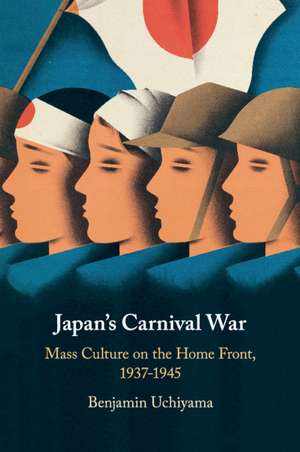Japan's Carnival War: Mass Culture on the Home Front, 1937–1945
Autor Benjamin Uchiyamaen Limba Engleză Paperback – 18 mar 2020
| Toate formatele și edițiile | Preț | Express |
|---|---|---|
| Paperback (1) | 285.37 lei 6-8 săpt. | |
| Cambridge University Press – 18 mar 2020 | 285.37 lei 6-8 săpt. | |
| Hardback (1) | 696.80 lei 6-8 săpt. | |
| Cambridge University Press – 13 mar 2019 | 696.80 lei 6-8 săpt. |
Preț: 285.37 lei
Nou
Puncte Express: 428
Preț estimativ în valută:
54.61€ • 56.94$ • 45.39£
54.61€ • 56.94$ • 45.39£
Carte tipărită la comandă
Livrare economică 21 martie-04 aprilie
Preluare comenzi: 021 569.72.76
Specificații
ISBN-13: 9781316637449
ISBN-10: 1316637441
Pagini: 292
Ilustrații: 27 b/w illus.
Dimensiuni: 152 x 229 x 15 mm
Greutate: 0.4 kg
Editura: Cambridge University Press
Colecția Cambridge University Press
Locul publicării:Cambridge, United Kingdom
ISBN-10: 1316637441
Pagini: 292
Ilustrații: 27 b/w illus.
Dimensiuni: 152 x 229 x 15 mm
Greutate: 0.4 kg
Editura: Cambridge University Press
Colecția Cambridge University Press
Locul publicării:Cambridge, United Kingdom
Cuprins
Introduction; 1. The reporter; 2. The munitions worker; 3. The soldier; 4. The movie star; 5. The youth aviator; Conclusion.
Recenzii
'In Japan's Carnival War, Benjamin Uchiyama brilliantly proposes a new, dynamic paradigm of Japan's total war in Asia. His 'carnival kings' - the circus freak, the reporter, the munition worker, the soldier, the movie star, and the tragic kamikaze pilot - embody and negotiate a strange mix of incitement and excitement, the hybridization of masculinity and femininity, and the fluidity of suppression. A must-read.' Sabine Frühstück, University of California, Santa Barbara
'This is a powerfully original look at the home front. Many Japanese supported the war effort, Uchiyama argues, not because of emperor worship, but because - like the other belligerents - they 'consumed' the war, enjoying sensational battlefield reportage, heroic narratives of the aviator, and the perks of well-paid munitions workers.' Sheldon Garon, Princeton University, New Jersey
'A remarkably fresh, indeed a startling, cultural history of total war. Uchiyama shows how Japanese people made sense of their own experience by engaging media icons such as the 'munitions worker' or the 'movie star' with irreverent mockery. Must reading for anyone interested in the global experience of World War II.' Andrew Gordon, Harvard University, Massachusetts
'Japan's Carnival War is innovative scholarship that features skillful archival research.' Lee K. Pennington, The Journal of Asian Studies
'This is the rare book that is both an impressive scholarly achievement and a fascinating read.' M. J. Wert, Choice
'In Japan's Carnival War, Benjamin Uchiyama offers a breath of fresh air to readers all too familiar with the narrative of tightening restrictions and stringent censorship that characterizes most depictions of Japan during the years of total war … The bottom line: this is an excellent companion book for those who have read widely on the war and crave a fresh perspective … Uchiyama's exhaustive archival work also enlightens the reader with thought-provoking details absent from standard histories of Japan at war …' A. Carly Buxton, Pacific Affairs
'Thanks to Uchiyama's heavylifting conceptualization of wartime culture, we now have a new, exciting sphere open for exploration.' Sayaka Chatani, American Historical Review
'a provocative and controversial book that will be required reading for anyone seeking to seriously grapple with the problem of state-society relations in Japan in the era of total war.' Janis Mimura, Monumenta Nipponica
'This is a powerfully original look at the home front. Many Japanese supported the war effort, Uchiyama argues, not because of emperor worship, but because - like the other belligerents - they 'consumed' the war, enjoying sensational battlefield reportage, heroic narratives of the aviator, and the perks of well-paid munitions workers.' Sheldon Garon, Princeton University, New Jersey
'A remarkably fresh, indeed a startling, cultural history of total war. Uchiyama shows how Japanese people made sense of their own experience by engaging media icons such as the 'munitions worker' or the 'movie star' with irreverent mockery. Must reading for anyone interested in the global experience of World War II.' Andrew Gordon, Harvard University, Massachusetts
'Japan's Carnival War is innovative scholarship that features skillful archival research.' Lee K. Pennington, The Journal of Asian Studies
'This is the rare book that is both an impressive scholarly achievement and a fascinating read.' M. J. Wert, Choice
'In Japan's Carnival War, Benjamin Uchiyama offers a breath of fresh air to readers all too familiar with the narrative of tightening restrictions and stringent censorship that characterizes most depictions of Japan during the years of total war … The bottom line: this is an excellent companion book for those who have read widely on the war and crave a fresh perspective … Uchiyama's exhaustive archival work also enlightens the reader with thought-provoking details absent from standard histories of Japan at war …' A. Carly Buxton, Pacific Affairs
'Thanks to Uchiyama's heavylifting conceptualization of wartime culture, we now have a new, exciting sphere open for exploration.' Sayaka Chatani, American Historical Review
'a provocative and controversial book that will be required reading for anyone seeking to seriously grapple with the problem of state-society relations in Japan in the era of total war.' Janis Mimura, Monumenta Nipponica
Notă biografică
Descriere
This cultural history of the Japanese home front during the Asia-Pacific War challenges ideas of the period as one of deprivation and repression.
